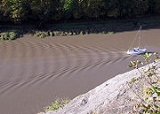
Wake
WordNet
noun
(1) A vigil held over a corpse the night before burial
"There's no weeping at an Irish wake"
(2) The wave that spreads behind a boat as it moves forward
"The motorboat's wake capsized the canoe"
(3) An island in the western Pacific between Guam and Hawaii
(4) The consequences of an event (especially a catastrophic event)
"The aftermath of war"
"In the wake of the accident no one knew how many had been injured"
verb
(5) Stop sleeping
"She woke up to the sound of the alarm clock"
(6) Cause to become awake or conscious
"He was roused by the drunken men in the street"
"Please wake me at 6 AM."
(7) Be awake, be alert, be there
(8) Make aware of
"His words woke us to terrible facts of the situation"
(9) Arouse or excite feelings and passions
"The ostentatious way of living of the rich ignites the hatred of the poor"
"The refugees' fate stirred up compassion around the world"
"Wake old feelings of hatred"
WiktionaryText
Etymology 1
- Middle English waken, Old English wacan
- Middle English wakien, Old English wacian
Verb
- (often followed by up) To stop sleeping.
- I woke up at 4 am this morning.
- (often followed by up) To make somebody stop sleeping.
- to lay out a body prior to burial in order to allow family and friends to pay their last respects.
Noun
Etymology 3
Probably Middle Low German from ( > Danish , Icelandic vök).
Noun
- The path left behind a ship on the surface of the water.
- The turbulent air left behind a flying aircraft.

